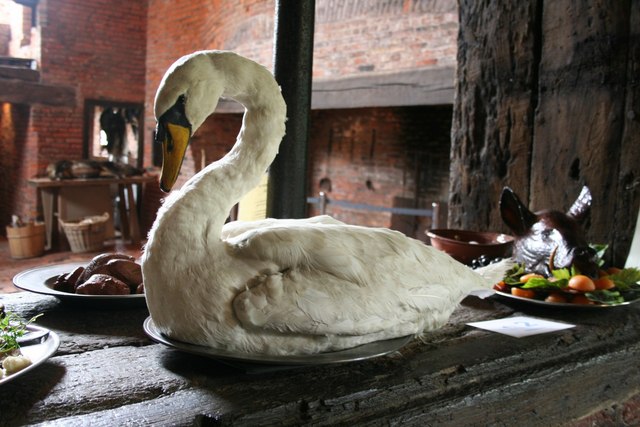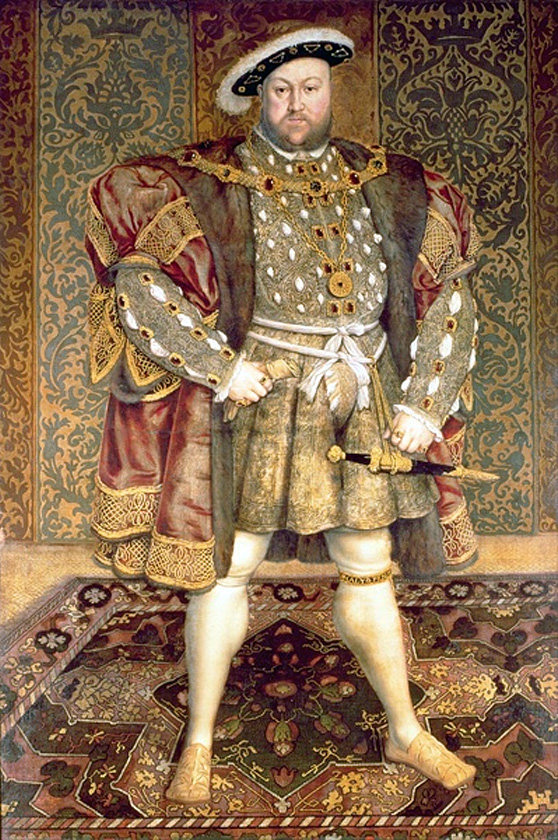this despotic ruler today, we may remember his six wives, of which one died, one survived, two he divorced and two he had beheaded. Or, as the children's rhyme goes; “Divorced, Beheaded, Died: Divorced, Beheaded, Survived.”
We may also picture the ageing Henry and his prodigious appetite. Game pies were a favourite, as were dishes based on cooked larks, snipes, quail, crane, partridge and sparrow; as well as eels, salmon, porpoises and dolphin. Such fare, undoubtedly, added to Henry's ever-growing girth; he reached a waist measurement of 54 inches (140 cm), as he was wheeled about in wheelchair like contraptions.
 There is no doubt that Henry is remembered often, as a sort of monster; especially, after he suffered jousting injuries, the first of which occurred in 1524. It is speculated that the various accidents that Henry sustained, like the one that left him "speechless" for two hours, may have caused brain injuries which made Henry act erratically and affected his whole personality. As historian Lucy Worsley has said about his first jousting injury: "From that date, the turnover of the wives really speeds up, and people begin to talk about him in quite a new and negative way."
There is no doubt that Henry is remembered often, as a sort of monster; especially, after he suffered jousting injuries, the first of which occurred in 1524. It is speculated that the various accidents that Henry sustained, like the one that left him "speechless" for two hours, may have caused brain injuries which made Henry act erratically and affected his whole personality. As historian Lucy Worsley has said about his first jousting injury: "From that date, the turnover of the wives really speeds up, and people begin to talk about him in quite a new and negative way." Henry, essentially, goes from being a charming, handsome and intelligent man, to an obese, cruel and paranoid tyrant. An ambassador at the Tudor court reported that in his youthful days: "His Majesty is the most handsomest potentate I have ever set eyes on. Above the usual height with an extremely fine calf to his leg and a round face so very beautiful it would become a pretty woman." However, Pope Paul III, in 1538, described Henry as a “most cruel and abominable tyrant.”
 | |
|
The Marquis of Exeter and Lord Montagu were beheaded for treason after discussing Henry's health. Saying of the King: "he has a sorre legge that no pore man would be glad off, and that he should not lyve long for all his auctoryte next God" and "he will die suddenly, his legge will kill him, and then we shall have jolly stirring."
When Henry did die, morbidly obese, in 1547, aged 55 and 7 months, probably from renal and liver failure, his body was prepared for burial by "spurging, cleansing, bowelling, searing, embalming, furnishing and dressing with spices." And then, the coffin, draped in cloth of gold with an effigy of the king, dressed with crown and crimson velvet shoes, was accompanied by a thousand men on horseback and hundreds more on foot, to Whitehall, where his body lay for a few days, then stopping overnight at Syon House, on the way to Windsor.
Henry's black marble sarcophagus, which he had callously confiscated from Cardinal Wolsey, contained his 300-pound corpse. And, according to Gilbert Burnet, Scottish theologian and bishop of Salisbury, the coffin leaked during the night, with “putrid matter” from the body, onto the floor and in the morning, a stray dog was seen licking the bodily fluids.
So, afterwards, some people may have told the coffin-leaking/dog licking story, which would neatly fulfil Peto's prophecy. The only problem being that, it probably didn't happen.

